Root hog and die, friend, root hog and die,
Gotta get to Boston, root hog and die.
Sacco and Vanzetti die at sundown tonight,
So I've got to get to Boston, root hog and die.
Train wheel can roll me, cushions can ride,
Ships on the oceans, planes in the skies.
Storms they can come, Lord, flood waters rise,
But I've got to get to Boston, for two men'll die.
Nicola Sacco, a shoe factory hand,
Bartolomeo Vanzetti, a trade union man,
Judge Webster Thayer swore they'll die,
But I've got to get to Boston, 'fore sundown tonight.
I might walk around, an' I might roll or fly,
Walkin' down this road shoulder, tears in my eyes.
They never done a wrong in their lives,
But Judge Webster Thayer says they must die.
Well, some come to Boston to see all the sights,
Some come to Boston to drink and to fight.
Sacco and Vanzetti told the workers "Organize!",
So Judge Webster Thayer says they must die.
Oh, Mr. Wagon Driver, please let me ride,
That's a nice-pacin' team that you got here all right.
Did you ever hear such a thing in your life?
Judge Webster Thayer killin' two men tonight.
Hey, Mr. Engineer, lemme ride your train,
Throw in your coal an' steam up your steam.
If I can't ride the shack, please lemme ride the blind,
Got to get to Boston 'fore sundown tonight.
Gotta get to Boston, root hog and die.
Sacco and Vanzetti die at sundown tonight,
So I've got to get to Boston, root hog and die.
Train wheel can roll me, cushions can ride,
Ships on the oceans, planes in the skies.
Storms they can come, Lord, flood waters rise,
But I've got to get to Boston, for two men'll die.
Nicola Sacco, a shoe factory hand,
Bartolomeo Vanzetti, a trade union man,
Judge Webster Thayer swore they'll die,
But I've got to get to Boston, 'fore sundown tonight.
I might walk around, an' I might roll or fly,
Walkin' down this road shoulder, tears in my eyes.
They never done a wrong in their lives,
But Judge Webster Thayer says they must die.
Well, some come to Boston to see all the sights,
Some come to Boston to drink and to fight.
Sacco and Vanzetti told the workers "Organize!",
So Judge Webster Thayer says they must die.
Oh, Mr. Wagon Driver, please let me ride,
That's a nice-pacin' team that you got here all right.
Did you ever hear such a thing in your life?
Judge Webster Thayer killin' two men tonight.
Hey, Mr. Engineer, lemme ride your train,
Throw in your coal an' steam up your steam.
If I can't ride the shack, please lemme ride the blind,
Got to get to Boston 'fore sundown tonight.
inviata da Adriana e Riccardo - 6/1/2006 - 14:40
Lingua: Italiano
Traduzione italiana di Riccardo Venturi
31 agosto 2014
Due parole del traduttore.Il modo di dire root hog or die (alla lettera: “grufola maiale, o muori”) significa “combatti o muori”; qui si noti che si dice and die, quasi non ci fosse alternativa alla lotta. Il testo della canzone presente in rete è sbagliato in alcuni punti, per il consueto procedimento della copia automatica e acritica di testi imprecisi; e così è rimasto a lungo anche in questo sito. All'ascolto sono stati effettuati gli opportuni aggiustamenti.
31 agosto 2014
Due parole del traduttore.Il modo di dire root hog or die (alla lettera: “grufola maiale, o muori”) significa “combatti o muori”; qui si noti che si dice and die, quasi non ci fosse alternativa alla lotta. Il testo della canzone presente in rete è sbagliato in alcuni punti, per il consueto procedimento della copia automatica e acritica di testi imprecisi; e così è rimasto a lungo anche in questo sito. All'ascolto sono stati effettuati gli opportuni aggiustamenti.
LOTTA E MUORI
Lotta e muori, amico, lotta e muori,
devo andare a Boston, lotta e muori.
Sacco e Vanzetti muoiono stasera a buio,
e io devo andare a Boston, lotta e muori.
Il treno può portarmi veloce, le corriere viaggiano,
ci sono navi sugli oceani e aeroplani nei cieli.
Dio santo, possono arrivare tempeste e alluvioni
ma io devo andare a Boston, perché due uomini moriranno.
Nicola Sacco, operaio in un calzaturificio,
Bartolomeo Vanzetti, sindacalista,
il giudice Webster Thayer ha giurato che moriranno
ma io devo andare a Boston prima di buio, stasera.
Potrei andare a piedi, in treno o in aeroplano,
camminare a bordostrada con le lacrime agli occhi.
Non hanno mai fatto nulla di male in vita loro,
ma il giudice Webster Thayer dice che devono morire.
Beh, qualcuno va a Boston per visitarla tutta,
qualcuno va a Boston per bere e fare a cazzotti.
Sacco e Vanzetti dicevano agli operai: “Organizzatevi!”,
e così il giudice Webster Thayer dice che devono morire.
Oh, macchinista, ti prego, portami,
hai proprio una bella squadra che fa andare il treno a puntino.
La hai mai sentita una cosa del genere nella tua vita?
Il giudice Webster Thayer ammazza due uomini stasera.
Ehi tu, fuochista, portami sul tuo treno,
butta dentro il carbone e fai fumare il vapore.
Se non posso andare sul carro di servizio fammi andare sul carro merci,
ma io devo andare a Boston stasera prima di buio.
Lotta e muori, amico, lotta e muori,
devo andare a Boston, lotta e muori.
Sacco e Vanzetti muoiono stasera a buio,
e io devo andare a Boston, lotta e muori.
Il treno può portarmi veloce, le corriere viaggiano,
ci sono navi sugli oceani e aeroplani nei cieli.
Dio santo, possono arrivare tempeste e alluvioni
ma io devo andare a Boston, perché due uomini moriranno.
Nicola Sacco, operaio in un calzaturificio,
Bartolomeo Vanzetti, sindacalista,
il giudice Webster Thayer ha giurato che moriranno
ma io devo andare a Boston prima di buio, stasera.
Potrei andare a piedi, in treno o in aeroplano,
camminare a bordostrada con le lacrime agli occhi.
Non hanno mai fatto nulla di male in vita loro,
ma il giudice Webster Thayer dice che devono morire.
Beh, qualcuno va a Boston per visitarla tutta,
qualcuno va a Boston per bere e fare a cazzotti.
Sacco e Vanzetti dicevano agli operai: “Organizzatevi!”,
e così il giudice Webster Thayer dice che devono morire.
Oh, macchinista, ti prego, portami,
hai proprio una bella squadra che fa andare il treno a puntino.
La hai mai sentita una cosa del genere nella tua vita?
Il giudice Webster Thayer ammazza due uomini stasera.
Ehi tu, fuochista, portami sul tuo treno,
butta dentro il carbone e fai fumare il vapore.
Se non posso andare sul carro di servizio fammi andare sul carro merci,
ma io devo andare a Boston stasera prima di buio.
Lingua: Italiano
Traduzione italiana di Matteo Podda
Questa ed altre canzoni delle "Ballads of Sacco and Vanzetti" rientrano anche in una traduzione italiana e personale rielaborazione intitolata "La Ballata di Sacco e Vanzetti, Matteo Podda canta Woody Guthrie", disponibile al sito La Ballata di Sacco e Vanzetti, by Matteo Podda - Bandcamp
Questa ed altre canzoni delle "Ballads of Sacco and Vanzetti" rientrano anche in una traduzione italiana e personale rielaborazione intitolata "La Ballata di Sacco e Vanzetti, Matteo Podda canta Woody Guthrie", disponibile al sito La Ballata di Sacco e Vanzetti, by Matteo Podda - Bandcamp
PRODUCI E CREPA
Produci e crepa, produci e crepa
Devo arrivare a Boston o produci e crepa
Sacco e Vanzetti moriranno al tramonto
E costi quel che costi devo arrivare a Boston
Le rotaie del treno possono portarmi
Le navi e gli aeroplani in mare e in cielo trasportarmi
Tempeste possono infuriare, fiumi straripare
Ma dritto fino a Boston al più presto devo andare
Produci e crepa, produci e crepa
Devo arrivare a Boston o produci e crepa
Sacco e Vanzetti moriranno al tramonto
E costi quel che costi devo arrivare a Boston
Nicola Sacco, operaio tagliatore
Bartolomeo Vanzetti, pescivendolo e oratore
Il giudice Thayer li ha condannati a morte
E bisogna arrivare a Boston prima che si faccia notte
Produci e crepa, produci e crepa
Devo arrivare a Boston o produci e crepa
Sacco e Vanzetti moriranno al tramonto
E costi quel che costi devo arrivare a Boston
Potrei vagabondare, rotolare o volare
Camminando su quest’autostrada, piangere e cantare
Non han mai fatto niente di sbagliato in vita loro
Ma la Giustizia ha svolto ancora bene il suo lavoro
Produci e crepa, produci e crepa
Devo arrivare a Boston o produci e crepa
Sacco e Vanzetti moriranno al tramonto
E costi quel che costi devo arrivare a Boston
Certi vanno a Boston per questi due compagni
Altri non ci vanno che per bere e fare a pugni
Sacco e Vanzetti spinsero ad organizzarsi
Ma il giudice Thayer li ha mandati ad ammazzarsi
Produci e crepa, produci e crepa
Devo arrivare a Boston o produci e crepa
Sacco e Vanzetti moriranno al tramonto
E costi quel che costi devo arrivare a Boston
O signor Conducente, dai, lasciami salire
Hai un gioiello di equipaggio, qui, e un motore niente male
Hai mai sentito niente assurdo come questa storia?
Il giudice uccide due innocenti questa sera
Produci e crepa, produci e crepa
Devo arrivare a Boston o produci e crepa
Sacco e Vanzetti moriranno al tramonto
E costi quel che costi devo arrivare a Boston
O signor Macchinista, che lavori tutte l’ore
Carica il carbone, fa soffiare alto il vapore
Non pretendo la carrozza, viaggerò sul tetto
Ma portami diretto a Boston prima del tramonto
Produci e crepa, produci e crepa
Devo arrivare a Boston o produci e crepa
Sacco e Vanzetti moriranno al tramonto
E costi quel che costi devo arrivare a Boston
Sì costi quel che costi devo arrivare a Boston
Produci e crepa, produci e crepa
Devo arrivare a Boston o produci e crepa
Sacco e Vanzetti moriranno al tramonto
E costi quel che costi devo arrivare a Boston
Le rotaie del treno possono portarmi
Le navi e gli aeroplani in mare e in cielo trasportarmi
Tempeste possono infuriare, fiumi straripare
Ma dritto fino a Boston al più presto devo andare
Produci e crepa, produci e crepa
Devo arrivare a Boston o produci e crepa
Sacco e Vanzetti moriranno al tramonto
E costi quel che costi devo arrivare a Boston
Nicola Sacco, operaio tagliatore
Bartolomeo Vanzetti, pescivendolo e oratore
Il giudice Thayer li ha condannati a morte
E bisogna arrivare a Boston prima che si faccia notte
Produci e crepa, produci e crepa
Devo arrivare a Boston o produci e crepa
Sacco e Vanzetti moriranno al tramonto
E costi quel che costi devo arrivare a Boston
Potrei vagabondare, rotolare o volare
Camminando su quest’autostrada, piangere e cantare
Non han mai fatto niente di sbagliato in vita loro
Ma la Giustizia ha svolto ancora bene il suo lavoro
Produci e crepa, produci e crepa
Devo arrivare a Boston o produci e crepa
Sacco e Vanzetti moriranno al tramonto
E costi quel che costi devo arrivare a Boston
Certi vanno a Boston per questi due compagni
Altri non ci vanno che per bere e fare a pugni
Sacco e Vanzetti spinsero ad organizzarsi
Ma il giudice Thayer li ha mandati ad ammazzarsi
Produci e crepa, produci e crepa
Devo arrivare a Boston o produci e crepa
Sacco e Vanzetti moriranno al tramonto
E costi quel che costi devo arrivare a Boston
O signor Conducente, dai, lasciami salire
Hai un gioiello di equipaggio, qui, e un motore niente male
Hai mai sentito niente assurdo come questa storia?
Il giudice uccide due innocenti questa sera
Produci e crepa, produci e crepa
Devo arrivare a Boston o produci e crepa
Sacco e Vanzetti moriranno al tramonto
E costi quel che costi devo arrivare a Boston
O signor Macchinista, che lavori tutte l’ore
Carica il carbone, fa soffiare alto il vapore
Non pretendo la carrozza, viaggerò sul tetto
Ma portami diretto a Boston prima del tramonto
Produci e crepa, produci e crepa
Devo arrivare a Boston o produci e crepa
Sacco e Vanzetti moriranno al tramonto
E costi quel che costi devo arrivare a Boston
Sì costi quel che costi devo arrivare a Boston
inviata da Matteo Podda - 19/8/2020 - 10:10
×
![]()

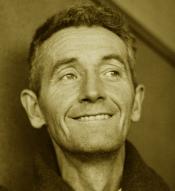
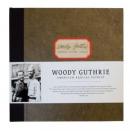
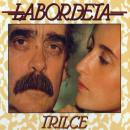



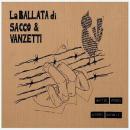
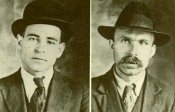
Lyrics and music by Woody Guthrie
Questa canzone, assieme ad altre, fu commissionata a Woody Guthrie tra il 1945 e il 1947 da Moses Asch
2. I Just Want To Sing Your Name
3. Old Judge Thayer
4. Red Wine
5. Root Hog And Die
6. Suassos Lane
7. Two Good Men
8. Vanzetti's Letter
9. Vanzetti's Rock
10. We Welcome To Heaven
11. You Souls Of Boston
12. Sacco's Letter To His Son (Pete Seeger)
Ballads of Sacco and Vanzetti è una raccolta di ballate folk scritte e interpretate dal cantautore americano Woody Guthrie, ispirate alla vicenda di Sacco e Vanzetti. Le ballate furono commissionate da Moses Asch nel 1945, e registrate tra il 1946 e il 1947. Guthrie non completò mai il progetto, e si ritenne insoddisfatto dal lavoro, sebbene suo figlio Arlo Guthrie, a sua volta cantautore professionista, giudicò le ballate del ciclo "Sacco e Vanzetti", tra le migliori mai composte da suo padre. Una canzone inedita, "Sacco's Letter To His Son", fu registrata da Pete Seeger per il progetto.
Ballads of Sacco & Vanzetti is a set of ballad songs, written and performed by Woody Guthrie, related to the trial, conviction and execution of Sacco and Vanzetti. The series was commissioned by Moe Asch in 1945 and recorded in 1946 and 1947. Guthrie never completed the project and was unsatisfied by the result. The project was released later in its abandoned form by Asch. An unreleased track, "Sacco's Letter To His Son" was recorded by Pete Seeger for the project.
Moses Asch was the founder/head of Folkways Records, which made available the music of Leadbelly, Woody Guthrie and Pete Seeger. Without this music, what would Dylan have been? Tom Piazza, writing in the April 1995 issue of The Atlantic Monthly, gives a history of Folkway Records and of Moses Asch:
"Born in Poland in 1905, Asch arrived in the United States when he was ten years old. He spent a few years in German in the early 1920s, studying electronics, but by the time he found himself back in New York, in 1926, his interest in American folk music had been stirred by his discovery, in a bookstall on a Paris quay, of John Lomax's book Cowboy Songs and Other Frontier Ballads.
"While building radio equipment and arranging sound systems for clients ranging from Yiddish theaters to burlesque houses on the Lower East Side, Asch came up with the idea of creating a record label to document the music that the larger commercial labels tended to leave alone.
"His idea was nourished not only by a love for the music itself but also by a brand of leftist populism in which folk expression was a voice for the disenfranchised. By taste and political conviction, Asch was attracted to the raw and the otherwise unheard.
"In the early 1940s he started two record companies, Asch and Disc. Both failed. Before folding them Asch recorded his most important artists -- the singer and songwriter Woody Guthrie and great twelve-string guitarist and singer Leadbelly.
"In 1947 Asch started Folkways, and this time it worked. Until his death, in 1986, Asch was Folkways' president, chief financial officer, talent scout, audio engineer, and sometimes shipping clerk."
"In 1987, the Smithsonian bought out Folkways, agreeing to keep all 2,200 Folkways albums in print. By writing or calling Smithsonian/Folkways (414 Hungerford Drive, Suite 444, Rockville, MD 20850; 301-443-2314 or fax 301-443-1819) one can order any Folkways title and receive a high-quality cassette, along with the original descriptive notes, for about $11. A free copy of the The Whole Folkways Catalogue, which lists every title, should be ordered first.
"It is," concludes Piazza in The Atlantic Monthly, "the definitive guide to Asch's bold, eccentric, priceless legacy."
It was an indirect impact on Dylan, but very major.
radiohazak.com